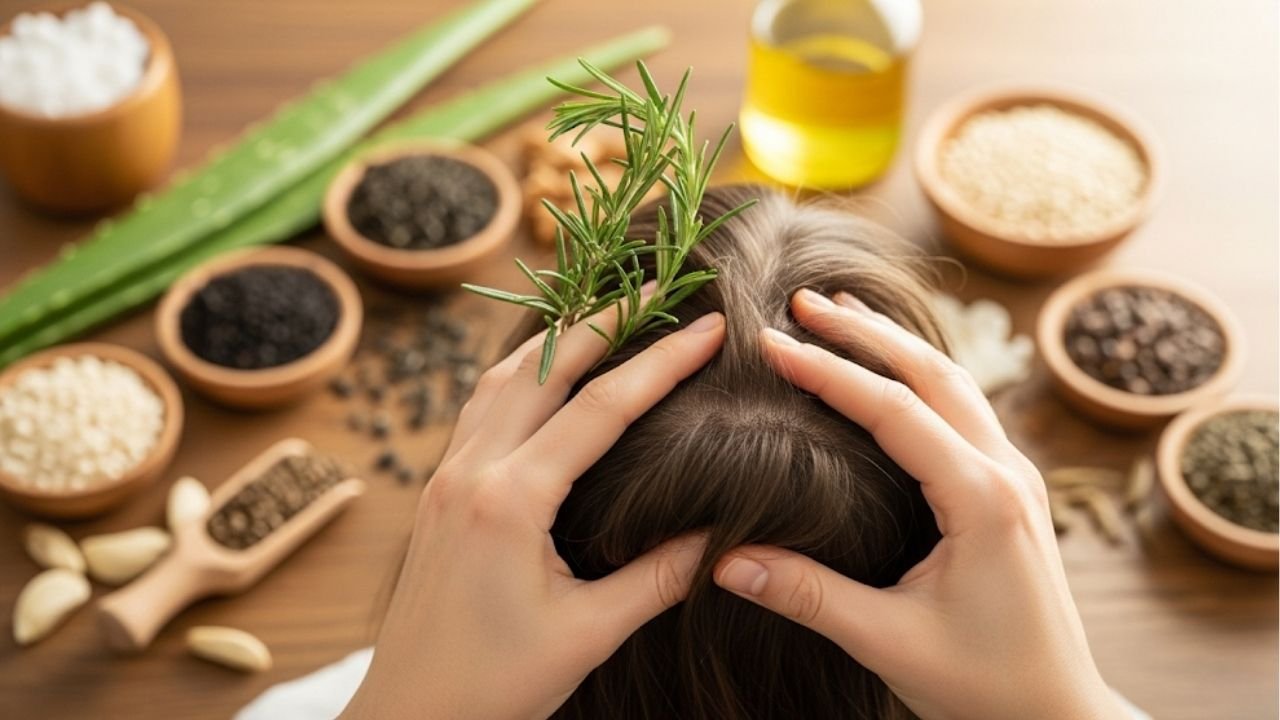10 Tips to Prevent Hair Loss Naturally

I still remember the moment I noticed more hair than usual on my pillow. It felt like betrayal. We all shed some hair every day—100 strands is normal. But this wasn’t normal. I started obsessively checking my comb, my shower drain, even my office chair. If you’re reading this, maybe you’ve felt that sinking feeling too. The truth is, hair loss can sneak up on anyone—male, female, young, old. It’s not just about looks; it hits your confidence like a truck.
The good news? You can slow it down—and even prevent it—with natural remedies and smart habits. These aren’t overnight miracles. But over time, they work. I’ve tried, researched, failed, and finally found what helped. This article is my honest guide to preventing hair loss naturally, without pills, expensive treatments, or scary side effects.
1. Nourish from the Inside Out: Food That Fuels Hair
Your hair is like a plant. If the roots aren’t healthy, it won’t grow right. Think of your scalp as soil—it needs nutrients to support growth. When I started losing hair, I realized I was eating junk most of the time. No wonder my hair was starving!
Here’s the deal: your hair thrives on proteins, iron, omega-3 fatty acids, zinc, and vitamins A, C, D, and E. If you’re missing even one of these, your strands start suffering.
Eat more of these foods:
-
Eggs – Packed with biotin and protein
-
Spinach – Rich in iron and folate
-
Nuts & seeds – Zinc, selenium, and healthy fats
-
Sweet potatoes – Beta carotene turns into vitamin A
-
Fatty fish – Salmon and mackerel are hair heroes
Quick tip: A warm cup of bone broth or homemade chicken soup can work wonders. Old-school, yes, but so good for your scalp.
Don’t underestimate food. I saw improvements within two months—less shedding, shinier hair, and stronger roots. Natural change takes time, but it’s real.
2. Scalp Massage: A Daily Ritual That Brings Results
I was skeptical too. Can rubbing your head really stop hair loss? Turns out—yes! Daily scalp massage improves blood circulation, which means more oxygen and nutrients reach your hair follicles. It also helps loosen tight areas, especially if you carry stress in your scalp (and many of us do).
Every night before bed, I started massaging my scalp for 5 minutes with my fingertips. No oils, just gentle circular movements. Some nights, I used warm coconut oil for extra nourishment. Within weeks, I felt the difference—my scalp tingled, and shedding reduced.
Here’s how to do it right:
-
Use fingertips, not nails
-
Work in small circles
-
Apply light pressure—don’t dig in
-
Be consistent, aim for 5–10 minutes daily
| Oil Options for Massage | Benefits |
|---|---|
| Coconut oil | Antibacterial, nourishes scalp |
| Castor oil | Boosts growth, thickens strands |
| Rosemary oil | Stimulates blood flow |
| Jojoba oil | Balances natural oils |
Scalp massage is free, easy, and oddly calming. It’s become part of my bedtime routine now.
3. Stress Less: What’s in Your Mind Shows on Your Head
You might not realize it, but stress is one of the sneakiest culprits behind hair loss. I didn’t believe it until I went through a rough breakup and noticed bald patches forming. Stress affects your hormones, especially cortisol, and that throws your whole body off balance—including hair growth.
The science backs it up too. Telogen effluvium, a common form of hair loss, is often triggered by sudden stress.
Here’s what helped me:
-
Journaling – Emptying my thoughts on paper at night
-
Breathing exercises – Just 4-7-8 breathing calmed me down
-
Walking in nature – 30 minutes a day, no phone, just trees
-
Laughter – Yes, it’s real medicine! Watch your favorite comedy
If your mind is overwhelmed, your hair will show it. Take care of your mental health—it’s not just “nice to have,” it’s essential.
4. Ditch the Heat: Give Your Hair a Break
Back in college, I flat-ironed my hair almost every day. It looked good… for a while. Then came the breakage, the dullness, and finally, hair fall. Heat styling tools—straighteners, curling irons, blow dryers—are like enemies in disguise.
Every time you crank up the heat, you’re drying out your strands, weakening the shaft, and stressing the follicles.
What I did:
-
Switched to air drying 90% of the time
-
Used a microfiber towel instead of rubbing with a regular one
-
Chose heatless hairstyles—braids, buns, loose waves
-
If I used heat, I never skipped heat protectant spray
Let your hair rest. It’s not about being anti-style—it’s about balance. Think of your hair like silk. Would you iron silk every day?
5. Stay Hydrated: Water = Hair Fuel
Hair is made of keratin, and like any part of your body, it needs water to function. When you’re dehydrated, your hair turns brittle. Your scalp gets dry and flaky. And yes, hair loss becomes more likely.
I used to skip water, living on coffee. But once I made hydration a priority, the change was real. My scalp wasn’t itchy anymore, and the hair felt stronger from root to tip.
Easy hydration tricks:
-
Start your day with 2 glasses of water
-
Keep a refillable bottle with you
-
Flavor with cucumber, lemon, or mint
-
Eat water-rich foods like cucumbers and oranges
If your body is a garden, water is the rain it needs to thrive.
6. Be Gentle with Wet Hair: It’s Most Vulnerable
One of the biggest mistakes I used to make? Brushing wet hair. Big no-no. Wet hair is like soggy spaghetti—easily stretched, snapped, and broken. If you’ve been rough-drying, towel-rubbing, or detangling wet strands, it’s time to change.
Here’s what works better:
-
Use a wide-tooth comb, not a brush
-
Pat dry with a soft towel—never rub
-
Apply a leave-in conditioner for slip
-
Let it air dry partially before combing
These small habits saved me a lot of hair. Be gentle—your strands are not rope.
7. Herbal Hair Masks: Nature’s Answer to Modern Problems
Our grandmothers knew something we forgot. Nature has always been rich in hair-healing herbs. I remember my aunt grinding fenugreek and applying it like a paste. I used to laugh. Now I’m doing the same—and loving the results.
These masks nourish the scalp, reduce inflammation, and strengthen the roots. They’re especially great for reversing early hair loss.
Try this easy recipe once a week:
-
2 tbsp fenugreek seeds (soaked overnight and ground)
-
2 tbsp yogurt (natural probiotic)
-
1 tsp olive oil
-
Apply for 30 minutes and rinse
Other great herbs: Amla, Henna, Neem, Brahmi, Aloe vera
It’s messy, sure. But it’s worth it. My hair felt thicker and softer within weeks.
8. Avoid Tight Hairstyles: Loosen Up for Your Hair’s Sake
Tight ponytails, buns, and braids look sleek—but they pull on your roots. Constant tension leads to traction alopecia, which can be permanent if ignored.
I used to tie my hair back all day. I thought it looked tidy. But it was causing damage I couldn’t see right away.
Now I follow the 3-2-1 rule:
-
3 days of loose styles
-
2 days of braids or buns
-
1 day for open hair or deep conditioning
Give your roots breathing room. Your scalp will thank you.
9. Sleep Right: Cotton Pillowcases Can Be Rough
Here’s something most people don’t realize—your pillowcase could be damaging your hair. Cotton absorbs moisture and creates friction. This leads to breakage and dryness. I switched to a satin pillowcase, and boom—less hair on the bed in the morning.
Also, sleep affects your hormones. If you’re not sleeping enough, or sleeping poorly, your body gets stressed. And remember—stress equals hair loss.
Better sleep = better hair. Prioritize it.
10. Listen to Your Body: Hair Is a Health Messenger
Your hair tells you when something’s wrong. For me, it was low iron. For my cousin, it was thyroid issues. Hair loss can be a sign of deeper health problems.
If you’ve tried everything and still lose hair, get tested:
-
Iron levels (especially ferritin)
-
Thyroid function (TSH, T3, T4)
-
Vitamin D and B12
-
Hormonal imbalances (PCOS, for women)
Trust your instincts. If something feels off, don’t wait. Hair loss is your body’s whisper—listen before it shouts.
Final Thoughts: It’s a Journey, Not a Quick Fix
Preventing hair loss naturally is a mix of patience, love, and consistency. It’s not about miracle cures. It’s about small habits done every day. When I stopped fighting my hair and started caring for it, it responded.
Here’s a quick recap:
- Eat hair-loving foods
- Massage your scalp daily
- Lower your stress levels
- Avoid heat and harsh styles
- Stay hydrated and sleep well
Remember—your hair is part of you. Treat it with the same kindness you’d show a friend.
